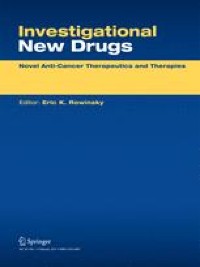Summary
Background Treatment of recurrent, unresectable granulosa cell tumor (GCT) of the ovary can be challenging. Given the rarity of the tumor, alternative therapies have been difficult to evaluate in large prospective clinical trials. Currently, to our knowledge, there are no reports of the use of immune checkpoint inhibitors in GCT patients. Here, we present a case series of GCT patients treated with pembrolizumab who were enrolled in a phase II basket trial in advanced, rare solid tumors (ClinicalTrials.gov: NCT02721732). Cases We identified 5 patients with recurrent GCT (4 adult and 1 juvenile type); they had an extensive history of systemic therapy at study enrollment (range, 3–10), with most regimens resulting in less than 12 months of disease control. Pembrolizumab was administered in these patients, as per trial protocol. Although there were no objective responses according to the irRECIST guidelines, 2 patients with adult-type GCT exp erienced disease control for ≥ 12 months (565 and 453 days). In one, pembrolizumab represented the longest duration of disease control compared to prior lines of systemic therapy (565 days vs. 13 months). In the other, pembrolizumab was the second longest systemic therapy associated with disease control (453 days vs. 22 months) compared to prior lines of therapy. In this patient, pembrolizumab was discontinued following withdrawal of consent. PD-L1 expression was not observed in any baseline tumor samples. Pembrolizumab was well tolerated, with no grade 3 or 4 treatment-related adverse events. Conclusions Although our results do not support the routine use of pembrolizumab monotherapy in unselected GCT patients, some patients with adult-type GCT may derive a clinical benefit, with a low risk of toxicity. Future studies should investigate the role of immunotherapy and predictors of clinical benefit in this patient population.



Δεν υπάρχουν σχόλια:
Δημοσίευση σχολίου
Σημείωση: Μόνο ένα μέλος αυτού του ιστολογίου μπορεί να αναρτήσει σχόλιο.